Media Partnership | Interview with Not-Yet Performance Festival
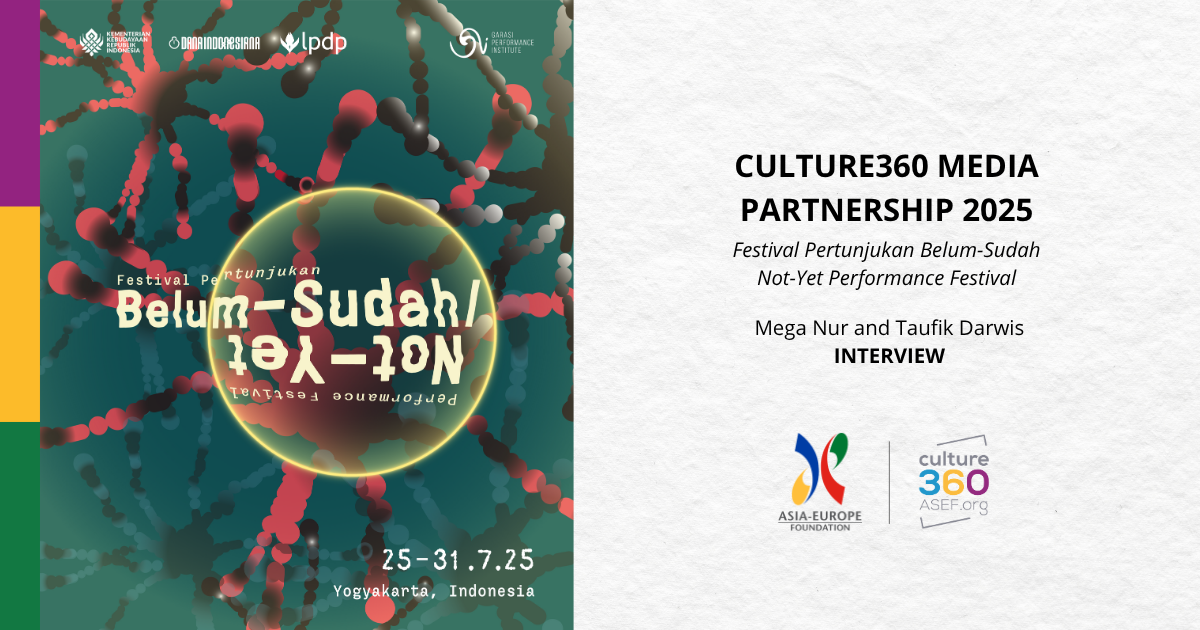
As part of culture360's Media Partnership with the Not-Yet Performance (Festival Pertunjukan Belum-Sudah), we speak with Festival curators Mega Nur and Taufik Darwis, for a deeper look into the process, productions and practices enveloped in this six-day event in Yogyakarta, Indonesia, packed with artistic and creative encounters from performances, to symposiums and morning coffee chats.
1. The Not-Yet Performance Festival is conceived as a forum and meeting space to nurture an exchange of ideas and performance practices rooted in Indonesia’s socio-cultural context and the dynamics of the Global South. What was it about the context in Indonesia, that made the organisers, Garasi Performance Institute, feel that such a platform was necessary?
Mega Nur and Taufik Darwis: For Garasi Performance Institute, the festival is not simply a programme. As we wrote in our curatorial statement, it is “a field of ideas — a living ground that is not fixed, but sprawling open — where artistic practice, affective care, and social speculation intertwine”. What we seek to cultivate are not only works, but the encounters themselves: how artists are accompanied, how works are tended together, and how audiences are invited to become part of this affective ecology.
The festival also places itself within the Global South. We share conditions marked by colonial residues, ecological ruptures, and uneven modernities. Many practices in Indonesia — dynamic yet fragile, often sprouting in fragments — echo the struggles of artists elsewhere in the South. The festival responds by offering a pluriversal forum, a garden of sorts, where dialogue and solidarity can take root beyond Western-centric frames.
This is why we call it the Not-Yet Performance Festival: it acknowledges that a just, open, and equal world is still in the making, and that performance may serve as rehearsal for that world — through unfinished gestures, resonances, and experiments that grow quietly in the cracks.
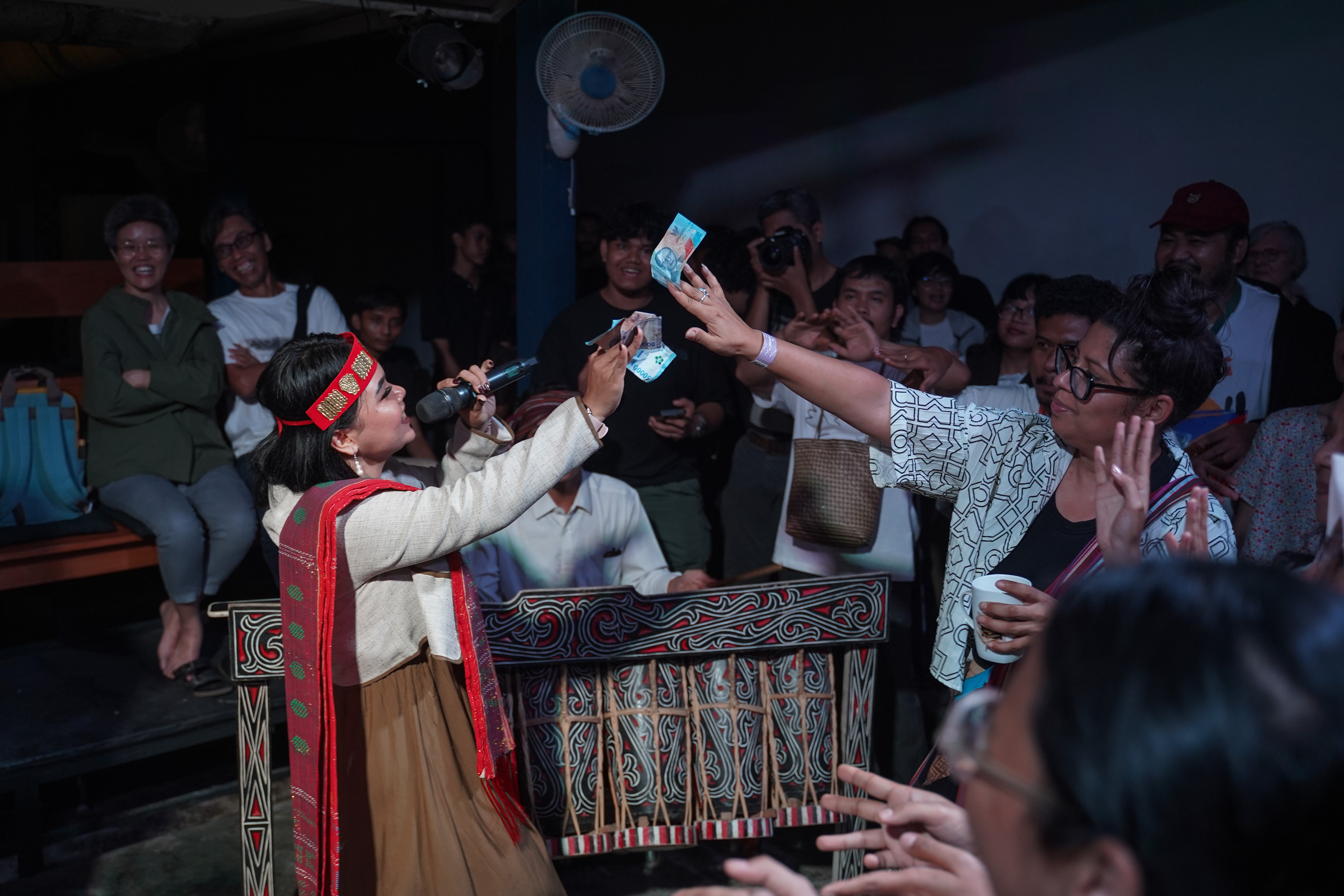
2. As an initiative of the collective Teater Garasi, the Garasi Performance Institute was established to expand and institutionalise Teater Garasi’s years of experiences on knowledge production and collective creation in the performing arts across Indonesia and Asia. How did these experiences and learnings help in the programming of the festival?
Mega Nur and Taufik Darwis: First, these experiences taught us the importance of designing a space that gives time, going beyond a venue for finished results. From the practice of Silang-Damping (the OpenLab Crossmentorship initiative run by the the Garasi Performance Institute, dedicated to the development of works-in-progress), for example, we developed a curatorial method that crosses disciplines and cultural locations, while accompanying artists closely in their processes. We brought this principle into the festival, so that what is curated is not only the works, but also the meetings, conversations, and relationships around them.
Second, the regional networks built through cross-Asia projects broadened our perspective: that many artists in the Global South face similar conditions, especially fragile infrastructures, colonial residues, and uneven modernities. This is why the vision of the festival is not only directed at the Indonesian context, but also at building conversations with performance ecosystems across Asia and the Global South.
In other words, the Not-Yet Performance Festival is an extension of our collective learning over more than two decades: that performance can be a field of ideas, a site of experimentation, as well as a space of care, allowing ideas and collective life to grow together.
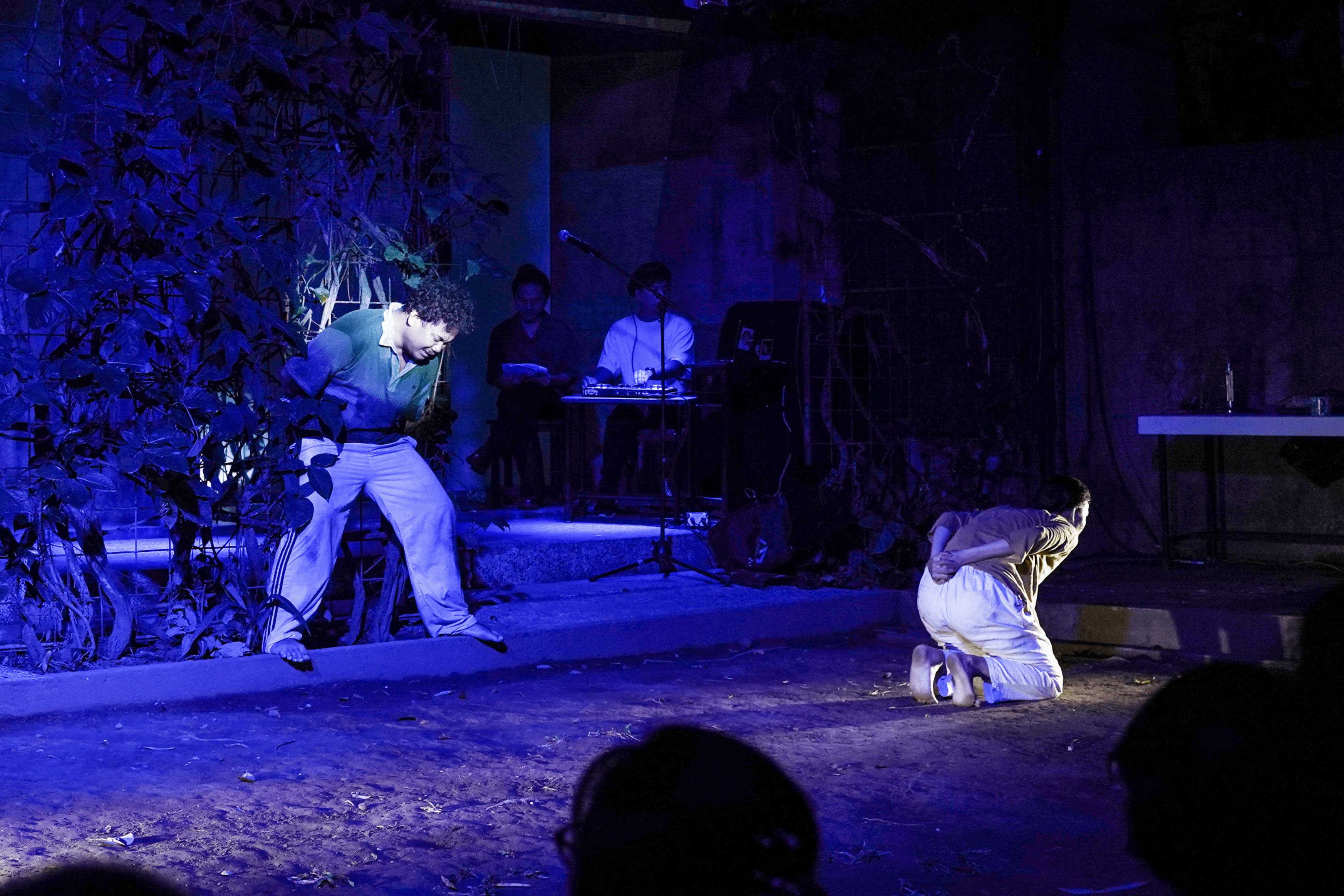 | 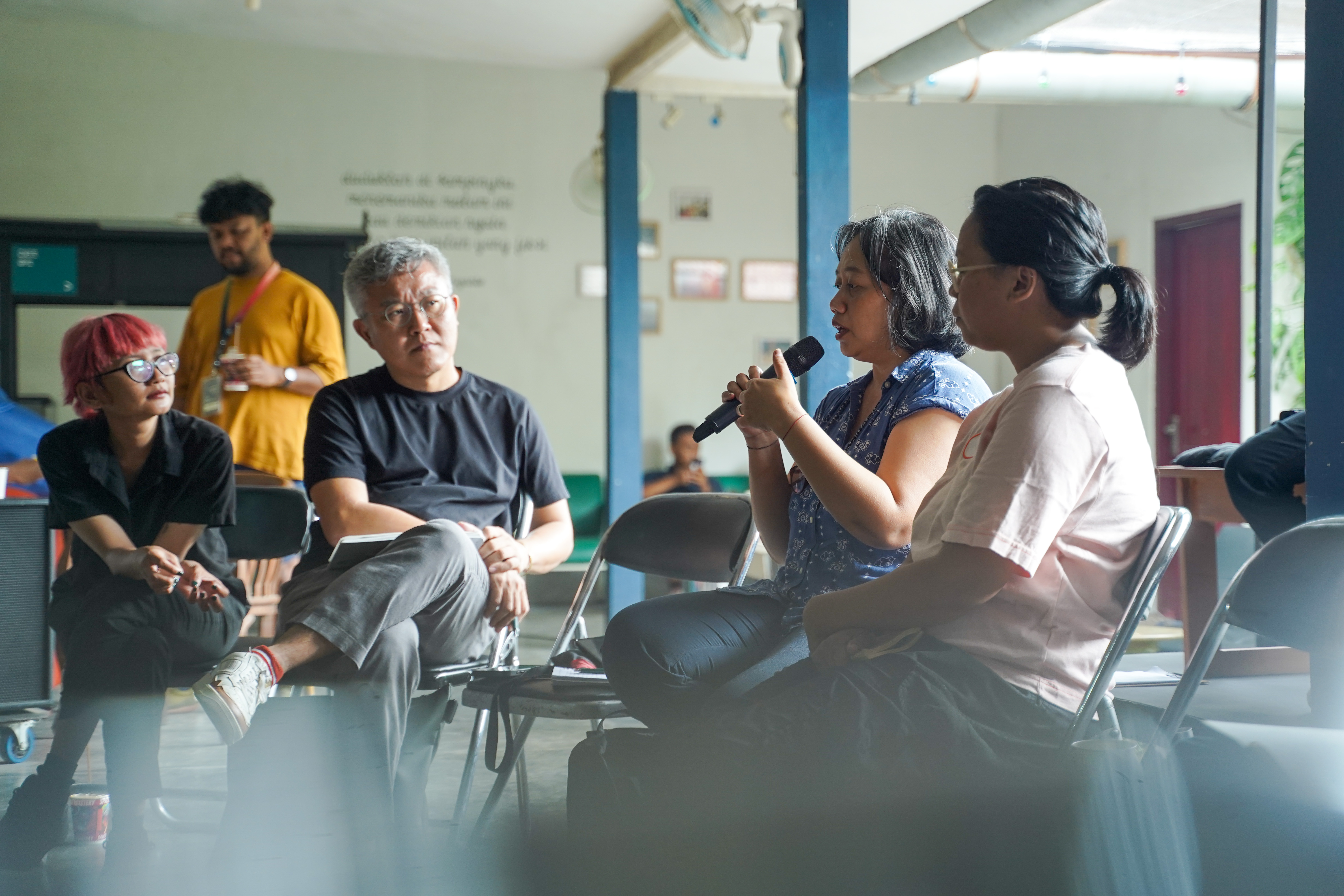 |
2. Kebun Warisan at Not-Yet Performance Festival © Garasi Performance Institute / Farhan Rizki | 3. Simposium © Garasi Performance Institute / Farhan Rizki |
3. The theme for the festival is “Gelagat Liar” (Wild Gestures). How does this theme echo throughout the programme of the festival, consisting of performances, forums and symposiums?
Mega Nur and Taufik Darwis: The theme “Gelagat Liar” (Wild Gestures) is more than a curatorial slogan; it is a working method: a way of sensing and responding to the world through gestures that creep in, take root at the margins, and ramify through cracks. Much like the so-called “Bacaan Liar” (Wild Readings) of the colonial era — texts circulated outside the censor’s control — “Gelagat Liar” is understood as a decolonial tactic: practices that resist domestication by dominant orders and instead cultivate potential from what remains unfinished or unruly.
In the performances, this comes alive through works that weave together body, archive, and memory in ways that open up alternative routes — whether through performative research, everyday choreography, or queer-camp aesthetics. In the forums and conversations, “Gelagat Liar” takes shape as spaces of resonance and exchange, rather than evaluative judgment.
The symposium extends this further, being conceived as a forum to think with performance. This approach allows critique to arise from within artistic practice rather than being imposed from outside. It is also reparative, seeking to amplify the potential of the works, respond to the alternative worlds they propose, and sustain the possibilities that emerge from them.
In this way, “Gelagat Liar” runs through the entire festival as more than a theme: it is a curatorial method, a mode of working, and a shared ground that turns the festival into a living laboratory where performances, conversations, and knowledge grow together.
4. In the arts and cultural sector, we are seeing a shift towards more collaborative events that are grounded in both local contexts and global conversations. The Not-Yet Performance Festival embraces collective learning and brings together artists from across Indonesia and conversations in the Global South. How do you feel this approach has enhanced the festival’s programming?
Mega Nur and Taufik Darwis: This collective and cross-contextual approach has been essential for us from the very beginning.
First, it ensures that works are not read in isolation, but in resonance with diverse social, historical, and embodied experiences. Artists from different parts of Indonesia, when brought together, carry their own landscapes with them, and it is precisely in these encounters that new readings emerge — on migration, gender, coloniality, or everyday practices.
Second, connecting with Global South conversations prevents the festival from falling into an isolated “local” narrative, instead situating it within a network of practices facing similar challenges: fragile infrastructures, colonial residues, and ecological crises. In this way, programmes such as Silang-Damping, the forums, and the symposium not only strengthen artists within the Indonesian context but also position them in dialogues across countries and across the South.
Ultimately, this approach enriches the festival in how it cultivates care: how we nurture an ecosystem that supports rather than competes, and how the encounter itself can be understood as a form of curating.
5. What is your vision for the future of the festival, bearing in mind that there are a growing number of similar festivals and platforms emerging in the region?
Mega Nur and Taufik Darwis: Our vision for the future of the festival is not to compete with other festivals or platforms, but to nurture difference and expand the web of encounters. We believe that every festival has its own ecology and context. With more festivals emerging in the region, it becomes even more important to resist homogenisation, and instead safeguard the diversity of curatorial approaches, ways of caring for works, and modes of engaging with audiences.
It is also about strengthening the festival as a space of collective experimentation: a place where organisers, artists, and audiences accompany one another and move through processes together; a place where reading and practice can enter into dialectical, critical, and reparative dialogue; and a place where the public is invited to read, sense, and extend the experience.
We also see the importance of cultivating solidarities across the Global South. The festival can be one node among many others, building resonance through difference and fostering conversations about a more just and pluriversal world.
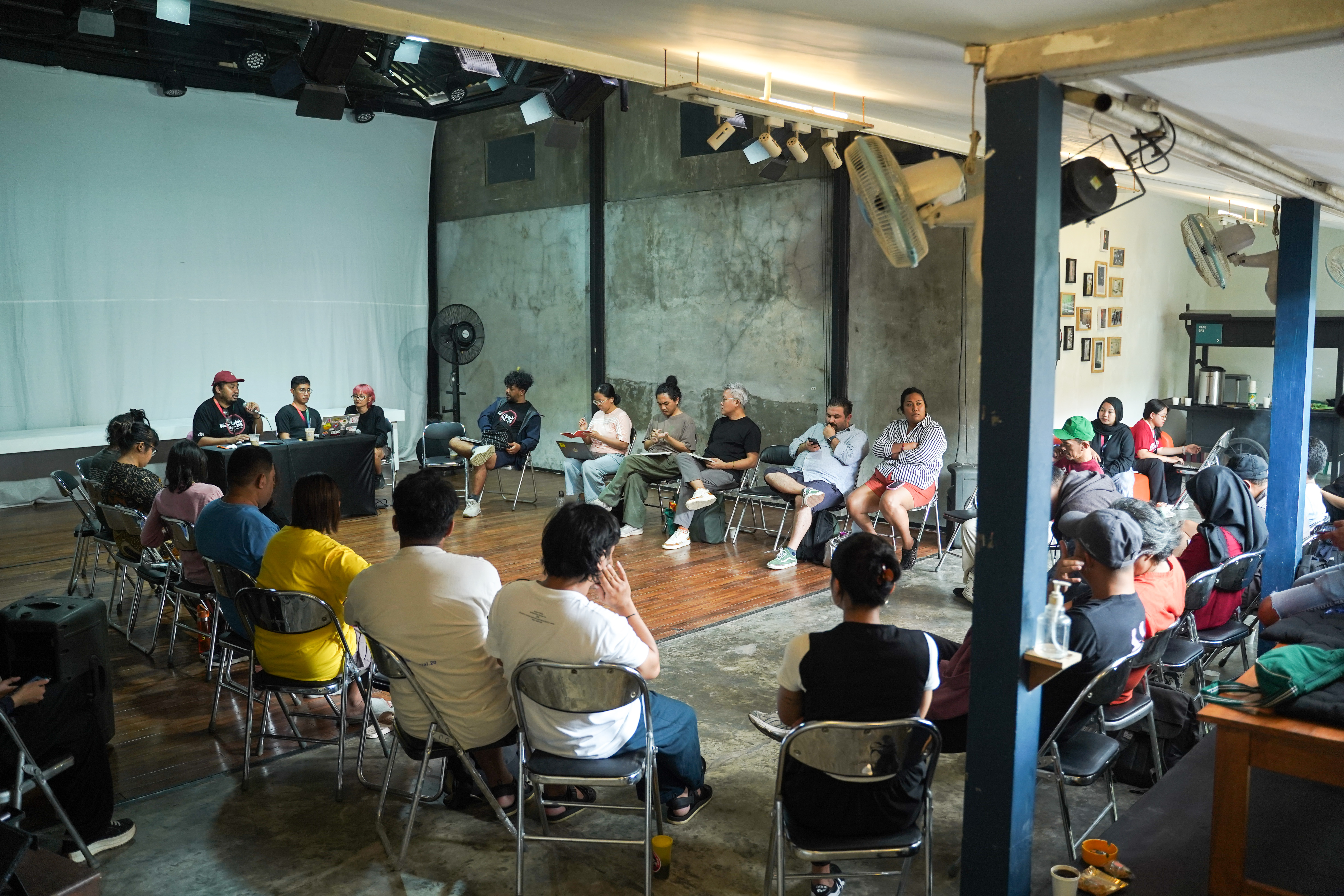
About the Interviewees
Taufik Darwis
Taufik Darwis is a dramaturg, curator, facilitator, and performance artist based in Bandung. He is a founding member of the BPAF Foundation, Majelis Dramaturgi, and an initiating member of Garasi Performance Institute. He has served as curator for various festivals such as the Kampana program at Indonesia Dance Festival (2016–2019). This year, he also produced Pseudo-Entertainment, a residency-based performance festival in Bandung.
Mega Nur
Mega Nur is a researcher and curator, interested in interdisciplinary practices and approaches. In recent years, she has been involved in curatorial work, artistic research, and the creation of alternative classes.
Since 2012, culture360.ASEF.org has supported the outreach and visibility of over 65 arts events in Asia and Europe. We strive to continue supporting on-site and virtual arts events across the 2 regions through a variety of communication activities. To know more, take a look at our Media Partnerships page and follow us on Facebook and Instagram.

